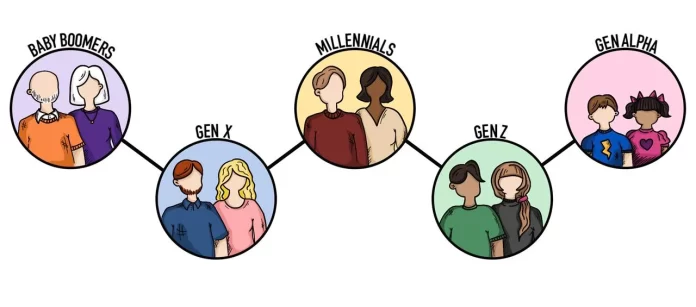I’m a part of Generation Z. That’s right, the ones who might ghost you on Instagram, or clap back at a hater. It might be main character energy but, no cap, I’m not trying to flex on anyone (for real). Especially not Millennials or Generation Alphas, since they too created slang that became normal to them. Like wildfire, slang spreads and burns itself into our brains. When analyzing the transformation of slang terms from the Millennial era, also known as Gen-Y (1981-1996), to Gen-Z (1997-2012), then to Gen-Alpha (2010-2024), I was left shaking in my boots. It’s fascinating to me how we consistently create new words to fit original meanings, and sometimes they end up being the funkiest, unintelligible, and hilarious words you’ve ever heard. So, I’m here to bless your brains with them while educating and entertaining you.
Millennials have first dibs for slang terms that made the most sense. In relation to their fashion style, everyone looked “basic AF” with skinny jeans and lightweight cardigans, but rocking the swag with friends was “squad goals,” indicating aspirations for your friend group. Even better, a dress-top over jeans and Keds were “on fleek,” meaning perfectly attractive or stylish. As a Gen-Z would say, they “ate” with the “drip” — another word for trendy or high quality clothes. Late-night parties would get “lit” but Gen-Zs would say “fire” or “hype” to mean awesome or exciting. A sleepover would consist of “spilling the tea,” or sharing juicy drama among friends or the “fam,” which is pretty unoriginal but self-explanatory. They influenced “FOMO” to happen, known as fear of missing out, if you couldn’t get tickets to that Christina Aguilera concert you really wanted to attend.
Some Gen-Z slang terms were offshoots of Millennial terms, but others were curated from new terms. As a Gen-Z, you had a “boo” by your side, while a Millennial’s significant other was their “bae.” The term “binge-watching” — meaning consecutively watching TV series or movies in one sitting — became common when the popularity of streaming platforms spiked. If you were a master in athletics, music, art, etc… you were the “CEO.” However, the “G.O.A.T,” standing for “Greatest Of All Time”, was a step above that. Someone like Chad Michael Murray was “highkey” the best heartthrob of the 2000s, meaning obviously or intensely, and who lived “rent free” in fans’ minds and on their bedroom walls. It essentially means something or someone has a significant impact on you emotionally. A meal was “bussin’” when it had exceptional taste, or if something was impressive it “slapped.” Did you mysteriously lose something you just saw a day before? That would be considered “sus,” short for suspect. I’m watching you, Student Union Society.
Gen Alpha gives us the most out-worldy slang, and perhaps the most senseless and out of context. On second thought, even with context, it will hurt your brain. As a punchline response and reaction to various scenarios, “6-7” is used to the point where it doesn’t make sense. For example, you might say you’re 6-7 after being asked how you are, or saying your celeb crush is 6-7, even though they are not 6’7”. It’s similar to when people used to say “YOLO” (You Only Live Once) or “type shit,” and that felt like a whole era on its own. “Good catch cheer” and “not my name, quarterback” is also quoted in any random context, and is generally a conversation filler loosely meaning a response to something being well-executed. It originally comes from a scene in the 2024 rom-com Sidelined: The QB and Me (2024) featuring TikTok’s very own heartthrob Noah Beck. Gen-Zs in particular might be familiar with having “rizz,” short for having charisma and charm. If you have bad charisma, you’re labelled as having “skibidi toilet rizz.” Skibidi alone is another synonym for bad, coming from the YouTube video and shorts series Skibidi Toilet (2023–). If you ask me, the terms give me the “ick,” which means being in disgust. They get more and more “delulu,” and I’m sure you can guess what real word that stems from.
Whether influenced by TikTok or pop culture, each generation’s unique slang terms are woven into the English language and prove that our creative capacity is unlimited. However, as our language evolves, we move farther away from the ability to understand it. Slang can encourage what some would call “brain rot” — our ability to be intellectually capable is decaying. It might be preventing us from understanding some of the greatest English produced in history like Shakespeare or Chaucer. It makes me wonder if slang is healthy for us. Regardless, it will be used as long as there is a next generation. I’ll tell you one thing — I am extremely intrigued to see what Gen-Beta comes up with.
Veronica is a Staff Writer at The Cascade. She loves to travel and explore new places, no matter how big or small. She is in her second year at UFV, pursuing the study of Creative
Writing.


